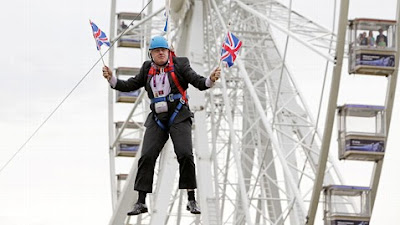The Greatest Show on Earth is now over, London is back to normal (tube closures, traffic and moaning are here again!). We can now look back at 16 days in the spotlight and the effect that it had on the image of the city.
To do this we hit the streets of London with a series short qualitative interviews about how the 2012 Olympics changed the city and its image. To live up to the second part of our name (Thinktank
International) we also looked overseas - holding a one hour ThinkOut Session (an online video conference discussion using Google Hangout) with Russian speakers, a mix of those who have or haven't been to London. All of them followed the Olympics 2012 on TV and are looking forward to hosting the next winter Olympics in 2014.
First of all, what did the 'party organisers' think?
Well, no surprises here. The London Olympics are viewed as roaring success in London. We think we have been great hosts and showed the world our new take on what Britain is about. What's changed? Well, there is a feeling that we are united as never before. English, Scots, Welsh, Irish and many others - all seemed comfortable under the Union Flag. Unity in combination with diversity have in fact become the top values that Britain projected during the Games, according to Londoners.
Inclusivity and equality were also big. Ex pats that we spoke to in the streets of London said that they've never felt so welcome and proud. "I think London 2012 really showed how diverse it actually is, a real capital of the world in the 21st century".
People also felt that it was still 'recognisably British' - like an updated version of software. Creativity, design and humour seemed to come out as strong ingredients in the new London formula. The Royal Family confirmed its place in the nation's heart and proved that it's not just Prince Harry that can arrive at parties in style.
How did it play abroad?
Well, surprisingly similar responses there too! It did feel like a global event. To people overseas, Britain showed itself as a nation proud of its past but also able to build upon its successes and reinvent itself, all the while keeping true to the original ingredients.
Britain, according to Russians, showed itself as a confident nation that can laugh at "Oneself" (even at the Highest level). For people less familiar with Britain the changes were probably even more pronounced. The traditional and conservative island of Mary Poppins, Winston Churchill, the original Sherlock Holmes, and smog has certainly become more diverse and multicultural in the eyes of the world after the Olympics. Surprisingly, Mo Farah's name came up even in conversations with Russians.
Post-Olympic Britain has brought another star into the international arena; Boris Johnson is now recognised internationally and described by Russians as an open and 'accessible' politician, with a good sense of humour. (The zip wire incident and dancing to the Spice Girls certainly boosted Boris's popularity overseas!) "I remember I could not believe that he was cycling on one of those bikes! I think it's fantastic!"
Sounds like Boris the brand works across borders and the world won't miss David Cameron should Boris hijack the throne.
There's also an interesting story emerging around British Brands. It seems fashion brands like Topshop and Ted Baker in particular have captured the spirit, presenting an updated image of Britain with the necessary creativity and design connotations. Both were mentioned in UK and Russia. Mini and the new Routemasters were also praised as a good take on new Britain, managing to build on the heritage and yet project creativity and modernity.
So! Cynicism left aside - the 2012 Olympics have really worked well as a marketing exercise - London and Britain refreshed their brands.
And what's really striking - this 'rebranding' exercise produced a surprisingly consistent results inside and outside of Britain.
The challenge is on Mother Russia now to do the same in Sochi in 2014!







